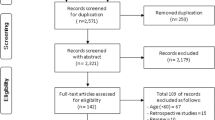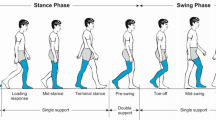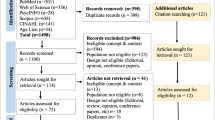Abstract
Dizziness is a common medical condition that has been related to falls in the elderly, and it is, therefore, considered a severe social health problem. Particularly in the elderly, the impact of dizziness may be relevant, as it has been linked to several conditions, such as isolation, depression, reduced self autonomy, and self control. The social, functional, and psychological well-being of those affected can be hampered significantly, thus reducing the quality-of-life (QoL) perception. In addition, due to the aging of the population in the developed world, dizziness is becoming a growing public health problem; an optimal management of this condition includes, nowadays, the improvement of rehabilitative programs, as well as the evaluation of QoL status and its management. The aim of this paper is to evaluate the impact of dizziness on the QoL in the elderly, also analyzing the instruments available, nowadays, to evaluate QoL of dizzy patients.
Similar content being viewed by others
References
Ciorba A (2015) Dizziness and the risk of falling in the elderly: a literature review. J Hear Sci 1:9–13
Lin HW, Bhattacharyya N (2012) Balance disorders in the elderly: epidemiology and functional impact. Laryngoscope 122:1858–1861
Ciorba A, Hatzopoulos S, Bianchini C, Aimoni C, Skarzynski H, Skarzynski PH (2015) Genetics of presbycusis and presbystasis. Int J Immunopathol Pharmacol 28(1):29–35
Iwasaki S, Yamasoba T (2014) Dizziness and imbalance in the elderly: age-related decline in the vestibular system. Aging Dis 9:6(1):38–47
Ekwall A, Lindberg A, Magnusson M (2009) Dizzy—why not take a walk? Low level physical activity improves quality of life among elderly with dizziness. Gerontology 55:652–659
Tamber AL, Wilhelmsen KT, Strand LI (2009) Measurement properties of the Dizziness Handicap Inventory by cross-sectional and longitudinal designs. Health Qual Life Outcomes 7:101
Ciorba A, Bianchini C, Pelucchi S, Pastore A (2012) The impact of hearing loss on the quality of life of elderly adults. Clin Interv Aging 7:159–163
Dros J, Maarsingh OR, Beem L, van der Horst HE, ter Riet G, Schellevis FG, van Weert HC (2011) Impact of dizziness on everyday life in older primary care patients: a cross-sectional study. Health Qual Life Outcomes 16(9):44
O’Loughhlin JL, Boivin JF, Robitaille Y, Suissa S (1994) Falls among the elderly: distinguishing indoor and outdoor risk factors in Canada. J Epidemiol Community Health 48:488–489
Rubinstein LZ, Josephson KR (2006) Falls and their prevention in the elderly people: what does the evidence show? Med Clin North Am 90:807–824
Stel VS, Pluijm SM, Deeg DJ, Smit JH, Bouter LM, Lips P (2003) A classification tree for predicting recurrent falling in community-dwelling older persons. J Am Geriatric Soc 51:1356–1364
Lawson J, Fitzgerald J, Birchall J, Aldren CP, Kenny RA (1999) Diagnosis of geriatric patients with severe dizziness. J Am Geriatr Soc 47(1):12–17
Felce D, Perry J (1995) Quality of life: its definition and measurement. Res Dev Disabil 16(1):51–74
Colledge NR, Barr-Hamilton RM, Lewis SJ, Sellar RJ, Wilson JA (1996) Evaluation of investigations to diagnose the cause of dizziness in elderly people: a community based controlled study. BMJ 313:788–792
Felce D (1997) Defining and applying the concept of quality of life. J Intellect Disabil Res 41(2):126–135
Tuunainen E, Rasku J, Jäntti P, Moisio-Vilenius P, Mäkinen E, Toppila E, Pyykkö I (2013) Postural stability and quality of life after guided and self-training among older adults residing in an institutional setting. Clin Interv Aging 8:1237–1246
Jacobson GP, Newman CW (1990) The development of the dizziness handicap inventory. Arch Otolaryngol HeadNeck Surg 116(4):424–427
Alghwiri AA, Marchetti GF, Whitney SL (2011) Content comparison of self-report measures used in vestibular rehabilitation based on the international classification of functioning, disability and health. Phys Ther Mar 91(3):346–357
Powell LE, Myers AM (1995) The Activities specific Balance Confidence (ABC) scale. J Gerontol A Biol Sci Med Sci 50:28–34
Cohen HS, Kimball KT, Adams AS (2000) Application of the vestibular disorders activities of daily living scale. Laryngoscope 110:1204–1209
Duracinsky M, Mosnier I, Bouccara D, Sterkers O, Chassany O (2007) Working Group of the Société Française d’Oto-Rhino-Laryngologie (ORL). Literature review of questionnaires assessing vertigo and dizziness, and their impact on patients’ quality of life. Value Health 10(4):273–284
Gomes Patatas OH, Freitas Gananca C, Freitas Gananca F (2009) Quality of life of individuals submitted to vestibular rehabilitation. Braz J Otorhinolaryngol 75(3):387–394
Socher DD, Socher JA, Azzi VJ (2012) Evaluation of quality of life pre- and post-vestibular rehabilitation in patients with benign paroxysmal positional vertigo associated with Meniere’s disease. Int Arch Otorhinolaryngol 16(4):430–436
Santos EM, Gazzola JM, Gananca CF, Caovilla HH, Gananca FF (2010) Impact of dizziness on the life quality of elderly with chronic vestibulopaty. Pro-Fono 22(4):427–432
Nola G, Mostardini C, Salvi V, Ercolani AP, Ralli G (2010) Validity of Italian adaptation of the Dizziness Handicap Inventory (DHI) and evaluation of the quality of life in patients with acute dizziness. Acta Otolaryngologica Italica 30:190–197
Fernandez L, Breinbauer HA, Delano PH (2015) Vertigo and dizziness in the elderly. Front Neurol 6:1–6
Takano NA, Cavalli SS, Ganança MM, Caovilla HH, Santos MA, Peluso Ede T, Ganança FF (2010) Quality of life in elderly with dizziness. Braz J Otorhinolaryngol 76(6):769–775
Lloyd SK, Kasbekar AV, Baguley DM, Moffat DA (2010) Audiovestibular factors influencing quality of life in patients with conservatively managed sporadic vestibular schwannoma. Otol Neurotol 31(6):968–976
Lasisi AO, Gureje O (2010) Disability and quality of life among community elderly with dizziness: report from the Ibadan study of ageing. J Laryngol Otol 124(9):957–962
Hsu LC, Hu HH, Wong WJ, Wang SJ, Luk YO, Chern CM (2005) Quality of life in elderly patients with dizziness: analysis of the Short-Form Health Survey in 197 patients. Acta Otolaryngol 125(1):55–59
Weidt S, Bruehl AB, Straumann D, Hegemann SC, Krautstrunk G, Rufer M (2014) Health-related quality of life and emotional distress in patients with dizziness: a cross-sectional approach to disentangle their relationship. BMC Health Serv Res 22(14):317
Soto-Varela A, Huertas-Pardo B, Gayoso-Diz P, Santos-Perez S, Sanchez-Sellero I (2016) Disability perception in Menière’s disease: when, how much and why? Eur Arch Otorhinolaryngol 273(4):865–872
Mira E (2008) Improving the quality of life in patients with vestibular disorders: the role of medical treatments and physical rehabilitation. Int J Clin Pract 62(1):109–114
Ferreira L, Ribeiro K, Costa de Lima K, Diniz J, Guerra RO, Ribeiro AJ, Lima L (2012) Quality of life assessment in elderly with dizziness complain. J Surg Cl Res 3(2):59–67
Author information
Authors and Affiliations
Corresponding author
Ethics declarations
This article does not contain any studies with human participants or animals performed by any of the authors.
Funding
None to declare.
Conflict of interest
None to declare.
Rights and permissions
About this article
Cite this article
Ciorba, A., Bianchini, C., Scanelli, G. et al. The impact of dizziness on quality-of-life in the elderly. Eur Arch Otorhinolaryngol 274, 1245–1250 (2017). https://doi.org/10.1007/s00405-016-4222-z
Received:
Accepted:
Published:
Issue Date:
DOI: https://doi.org/10.1007/s00405-016-4222-z




